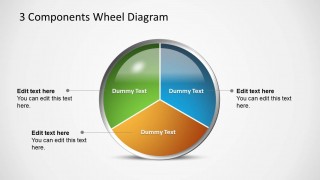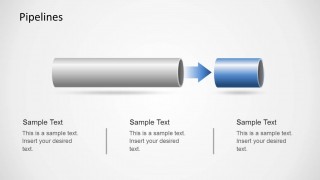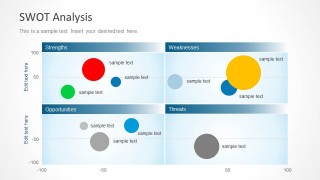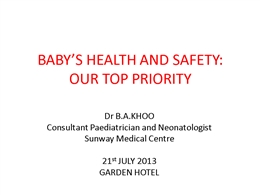Learn more how to embed presentation in WordPress
Copy and paste the code below into your blog post or website
Copy URL
Embed into WordPress (learn more)
Comments
comments powered by DisqusPresentation Slides & Transcript
Presentation Slides & Transcript
GENIUS:NATURE OR NURTURE?Dr B.A.KhooConsultant Paediatrician and Neonatologist Sunway Medical Centre
CONTENT Who is a genius?Genius: made or born?The biological basis of a geniusThe neurobiology of giftednessStages of brain developmentWhat can we do to optimized our children’s growth and development?When nature meets nurture?Conclusion
Qualities of a geniusA person with extraordinary intellectual ability and originality, talent and creative powerExceptionally high intelligent quotient (IQ) > 140Top 0.1%, i.e. 3 standard deviation or greater, among peers “Talent hits a target no one else can hit; Genius hits a target no one else can see” — Arthur Schopenhauer
Top 10 geniuses – based on IQ 10. Madame De Stael (IQ: 180)9. Galileo Galilei (IQ: 185)8. Bobby Fischer (IQ: 187)7. Ludwig Wittgenstein (IQ: 190)6. Blaise Pascal (IQ: 195)5. John Stuart Mill (IQ: 200)4. Gottfried Wilhelm von Leibniz (IQ: 205)3. Emanuel Swedenborg (IQ: 205)2. Leonardo Da Vinci (IQ: 205)1. Johann Wolfgang von Goethe (IQ: 210)
Based on originality, talent and creative powerAlbert Einstein (IQ = 160) - The Nobel Prize in Physics 1921 (E=MC2)Wolfgang Amadeus Mozart (27 Jan 1756 – 5 Dec 1791) (IQ = 165) – classical music composer genius Bill Gates (IQ =160) – Microsoft CEO Stephen W. Hawking (IQ = 160) – Applied mathematician and theoretical physicist
Born or Made? “Getting to be ‘tall plant’ takes nurture as well as nature”
Born or Made?Early vs late bloomers – everyone of us bloom at different time and therefore there is no end point on what anyone is capable of achieving in their life time.Environment count Genes are finite whereas the potential of our brain in infinite – education, knowledge, learning and experiences will greatly influence the number of new connections of our brain make over a lifetime.Our brain never stops growing – Our brain grows new cells /neurons all the time, the trick is to stimulate them to prevent them from drying off “What we are born with matters, but what we do with it matters ever more”
Learning from the childhood of Mozart, Da Vinci and EinsteinMozart – father was an established violinist and musician. Young Mozart showed his interest in music and his parents encouraged him and supported him fully Da Vinci – his parents supported him from young to explore wide range of interests in mathematics, science, music and art. Einstein – From being a baby, his parents supported him greatly in developing his gifts and talent. It was 8 years after his graduation that his thinking, idea and creativity began to be discovered and recognized. What do all these 3 geniuses have in common?
The foundation of genius?Parents who believed in their abilities as children and supported themIndividual abilities in various fieldsOpportunities to develop their own individual gifts and talentsNo sense of any limits being set on their abilitiesAge immaterial, ability the focusDiscovery, recognition and appreciation of their abilities by othersBeing in the right place at a right time
THE BIOLOGY OF A GENIUSAverage human brainadult human ~ 1,300-1,400 gNewborn ~ 350-400 g (~ 1/4 of adult size)Percentage of brain to total body weight ~ 2%Average of neurons in the brain ~ 100 billionRate of neuron growth (early pregnancy) = 250,000 neurons/minuteComposition of brain – 2/3 are made up of fat
BRAIN’s GROWTH
ANATOMY OF HUMAN BRAIN
NEUROANATOMY OF HUMAN BRAIN
THE FUNCTIONAL AREA OF HUMAN BRAIN Prefrontal area – elaboration of thought and memoryMotor-sensory cortex – gross & skilled movement Parieto-occipital visual cortex – visuospatial areaWernicke’s area – understanding and comprehension of written and spoken languageAuditory and Broca’s area – hearing and speech areaCerebellum – balance/rhythmHippocampus – long term memory and spatial navigation
BRAIN’S DOMINANT
The neurobiology of giftednessBrain and nervous system are more highly develop, more neural connection and complexMore differentiated frontal cortexLess compartmentalized hippocampus
The neurobiology of giftednessDissecting the genius’s brainSignificant increase of glial cells in the left parietal cortexIncrease glial:neuronal ratioLarger inferior parietal lobule and unfolded parietal lobeVisuo-spatial mathematical intelligence
Stages of brain development of the gifted childrenNational Institute of Mental Health (NIMH) and McGill University in Montreal had conducted a study of brain scans on 309 healthy children between the ages of 6 and 19Children with higher IQ :Begin with relatively thin cortex which grew thicker overtime before reaching peak at age 11-12 compared to average intelligent children peak by age 8 yrs old“Peak at the RIGHT time”
STAGES OF BRAIN DEVELOPMENTStudies of brains have taught us that people with higher IQs do not have larger brains. We can now see that the difference may be in the way or pattern the brain develops and not in sheer brain size or special structure
THE IMPORTANCE OF NURTURING – “THE USE IT OR LOSE IT PRINCIPLE” Thomas Edison (IQ~ 145) but that matters only 1% of the time because genius is 1% inspiration and 99% perspiration. The brain can be developed just the same as the muscles can be developed (neuroplasticity), if one will only take the pains to train the mind to thinkBrain development relies on the way the brain is used and stimulated i.e. our children’s daily activities and environment.
WHEN NATURE MEETS NURTURE NUTRITION - “you are what you eat”ENVIRONMENT EDUCATION EXPERIENCES
WHERE NATURE MEETS NURTURE Dos (Give our babies a good start)Good antenatal care with your gynaeAttend antenatal classes with your spouseBalance between work, regular exercise and adequate restEat healthy and balance dietTake time to communicate with your unborn child eg: talking, reading, singing, listening to music etc.Don’ts (Do no further harm)Avoid strenuous exercise and stressful assignmentsAvoid smoking (contribute to a least 1% drop in cognitive function)Avoid drugs/alcohol
BREAST FEEDING An excellent brain food WHO – strongly recommend full breast feeding for at least 6 months – 2yrs or beyondWorld Alliance for Breastfeeding Action (WABA) on the benefits of breast milkGood for healthEnhances brain developmentContain vital nutrients that are essential for brain growth and development.
BENEFITS OF BREASTFEEDINGBreast milk – rich in living cellsantibodies and live friendly bacteria good for baby’s digestive and immune systems High level of antioxidants (Vit E and beta carotene)Boost baby’s immune systemsHigh level of nucleotides (structural unit of DNA)Source of chemical energy (ATP, GTP)Cellular signaling (cAMP, cGMP)Co-factors of enzyme reaction
More benefits of breast feedingOptimum level of Essential PUFA – ALA and LAALA (omega 3) DHA LA (omega 6) AA Building block of brain cells, synaptogenesis, cell membrane function and myelination Better visual developmentBetter learning and reading abilitiesPromotes maternal-child bonding Positive interaction for better language developmentBetter social behavior and social skillsEnsure confident child
Evidence based medicine on breast feeding and breast milk
Nutrients for brain development
Food sources for brain nutrients
“All nutrients are essential for growth and brain development and there is no single nutrient that should be particularly emphasized as providing your child with well balanced diet”
CONCLUSIONS One is not born a genius, one becomes a genius - Simone de Beauvoir Our children are born at the right place at the right time – the 21st centuryThe conception period and the first 3 years of life is crucial for brain development and intervention - family support is crucialThe way/pattern the brain develops is more important than its anatomical structure or sizeBREAST IS THE BEST
Take home message Every child is unique and special with great potentialWhat are our roles as parents?Respect our children and nurture them with love Provide right nutrition for healthy growth and brain developmentGive them every opportunity to learn and expose Provide safe environment for them to play, explore and learn freely Provide them with proper educationsTeach them Godly values and moral principles
DISCLAIMER The texts, advices, recommendations and suggestions in this presentation will not guarantee your child becoming a genius and I will not be held responsible for that. But it will help to ensure that they grew up not only smart and intelligent, but also strong and healthy physically, full of wisdom, confident, teachable, fear of God with good morale and have a loving heart towards their fellow peers and people around them.
THANK YOU











